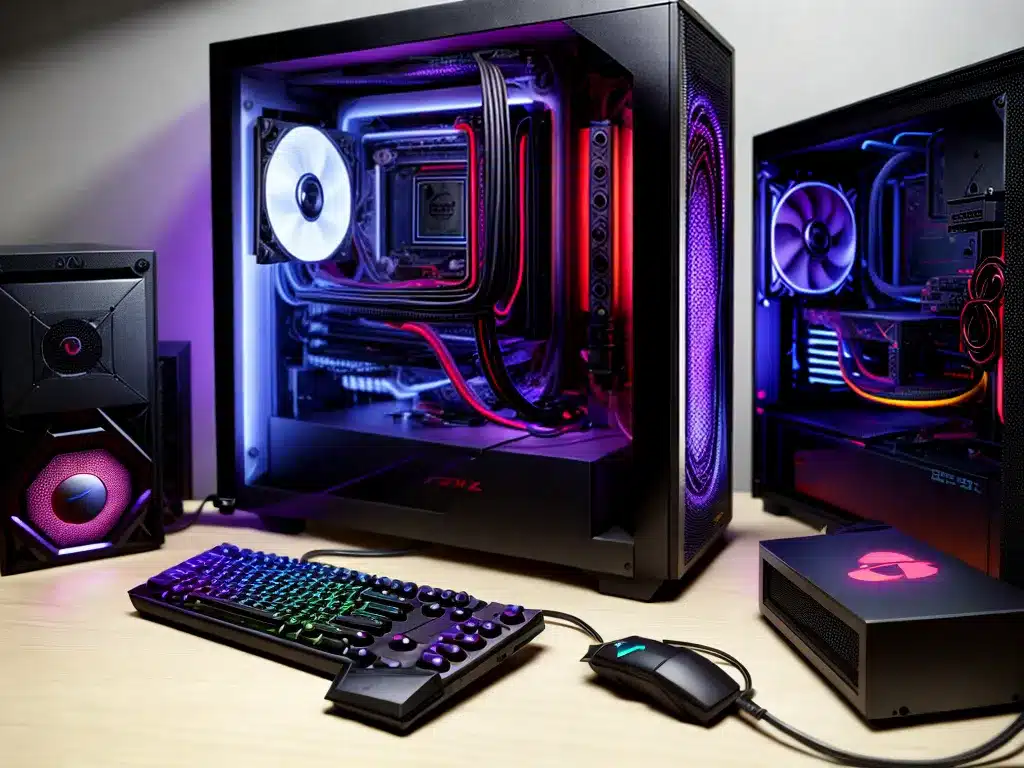
Having a silent gaming PC is important for many gamers who want to enjoy their gameplay without distracting fan noise. There are several components you can choose to minimize noise in your custom gaming PC build.
Case Selection
The computer case you select plays a big role in controlling noise. Look for cases with sound-dampening materials like dense foam lining the side panels. Cases made of heavier steel rather than aluminum also reduce reverberation of component noise. Some features to look for include:
- Foam dampening on side panels – Reduces noise leakage from internal components.
- Sound-dampening material on front panel – Minimizes noise from front-mounted fans.
- Solid steel construction – Heavier cases don’t amplify noise as much as lightweight aluminum.
- Noise-isolating drive cages – Prevent vibration and mechanical drive noise.
- Cable management space – Allows you to route cables neatly to promote proper airflow.
Popular nearly silent cases include the Fractal Design Define R6, be quiet! Silent Base 801, and Corsair Carbide Series 275Q.
CPU Cooler
The CPU cooler is often the primary source of noise in a computer. Choosing a quiet cooler rated at low noise levels is critical. Some features to look for:
- Large heatsinks with heatpipes – Allows for cooling at lower, quieter fan speeds.
- High quality rifle or hydraulic bearing fans – Produce less vibration and noise than cheaper sleeve bearing fans.
- Low maximum RPM fans – Lower fan speeds equals less noise. Look for ~1500 RPM or less for 120mm fans.
- ** PWM Fan Control** – Lets motherboard control fan speed based on CPU temperature.
Excellent quiet coolers include Noctua NH-D15, be quiet! Dark Rock Pro 4, and Scythe Ninja 5. Liquid AIO coolers like the Corsair H100i are also quiet options.
Graphics Card
The graphics card cooler and fans are another big source of noise. Consider cards with:
- Large triple fan coolers – Cools efficiently with lower, quieter fan speeds.
- 0dB silent fan modes – Fans turn off at low load.
- Quiet bios options – Reduces maximum fan speed for less noise.
Quiet cards like the MSI Gaming X Trio, Asus ROG Strix, and Gigabyte Aorus are good options. Also consider liquid cooled cards like the EVGA Hybrid for silent operation.
Power Supply
The power supply cooling fan contributes noticeable noise in a gaming PC. Look for units with:
- 120mm+ size fan – The larger the fan, the slower it needs to spin. 140mm is ideal.
- Semi-passive or passive modes – Fan stays off at low to medium loads.
- 80 Plus Gold or better certified – Higher efficiency equals less waste heat and noise.
Recommend PSUs are the Corsair RMx, SeaSonic Focus Plus Gold, and be quiet! Straight Power 11.
Case Fans
Supplementary case fans should also be selected with low noise in mind. Ideal specs:
- 120-140mm sizes – Allows good airflow at lower RPMs.
- ** Rifle or hydraulic bearings** – Less noise than cheaper sleeve bearings.
- 800-1200 RPM speed range – Enables tuning of airflow/noise balance.
Great options are Noctua NF-P12, be quiet! Silent Wings 3, and Corsair ML120. Install fan filters to prevent dust build up and higher fan speeds over time.
Storage Drives
Spinning hard disk drives introduce vibration and mechanical noises. Using quieter solid state drives helps reduce noise.
- 2.5″ SSDs – Smaller with no moving parts results in silent operation.
- M.2 NVMe SSDs – No cables or drive activity noises.
Top performing quiet drives are the Samsung 970 Evo Plus M.2 and Crucial MX500 2.5″ SSD.
Acoustic Dampening Materials
Additional noise absorbing materials can be installed to further reduce noise from specific components. Consider adding:
- PSU shroud filler – Mutes noise from PSU and GPU.
- Fan grill foam pads – Reduces fan vibration noises.
- 3M sound dampening sheets – Lining inside panels absorbs noise leakage.
- Acoustic foam pads – Applied to side panels to absorb vibrations.
With careful component selection and noise isolation materials, you can build a powerful gaming PC that runs silently for immersive game experiences. Let me know if you need any clarification or have additional questions!












